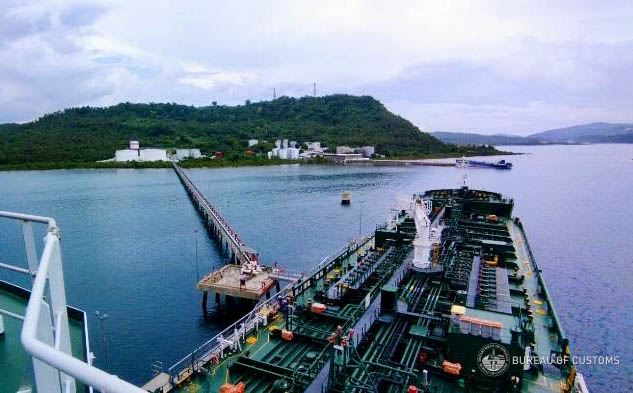
-
The Bureau of Customs-Port of Legazpi received its first-ever fuel importation on May 8, 2023
-
The shipment arrived aboard MV Peninsula XI at Pasacao port, Camarines Sur
-
The vessel was carrying 5.076 million liters of gasoil consigned to Jetti Petroleum Inc
-
Legazpi port was included in the list of authorized ports of discharge for gasoline, diesel, and kerosene arriving in bulk under Customs Memorandum Order No. 04-2023
-
BOC-Legazpi hopes this inclusion will encourage more investors to bring in fuel products to the port
The Bureau of Customs (BOC)- Port of Legazpi received its first-ever fuel importation on May 8, 2023.
The shipment arrived aboard MV Peninsula XI at Pasacao port, Camarines Sur.
The vessel was carrying 5.076 million liters of gasoil consigned to Jetti Petroleum Inc., BOC said in a statement.
The development comes after Legazpi port, along with Aparri, San Fernando (La Union), and Zamboanga, were added in the list of authorized ports of discharge for gasoline, diesel, and kerosene arriving in bulk under Customs Memorandum Order (CMO) No. 04-2023.
READ: BOC adds 4 ports for offloading unmarked fuel
CMO dated March 7 amends CMO 43-2019, which provides implementing rules for the conduct of BOC’s fuel marking program pursuant to Joint Circular (JC) No. 01-2019, which in turn executes the mandatory marking—after the taxes and duties have been paid—of refined, manufactured, or imported gasoline, diesel and kerosene in the Philippines, including those withdrawn from Free Zones to be introduced into the country.
BOC-Legazpi’s first fuel shipment is set to be marked in accordance with the fuel marking program.
With this development, BOC-Legazpi is confident it will hit and even surpass its monthly revenue collection targets in the future.
BOC-Legazpi is also hopeful that its inclusion as an authorized port of discharge for fuel imports will encourage more investors to bring in fuel products to the port.
The implementation of the fuel marking program is among the key provisions of Republic Act 10963 or the Tax Reform for Acceleration and Inclusion (TRAIN) Law. Marking of fuel products, whether imported or manufactured in the Philippines, will become mandatory five years after the TRAIN Law took effect on January 2018.
Fuel marking aims to curb oil smuggling and plug revenue losses arising from the illegal importation or misdeclaration of petroleum products.
Petroleum products covered by CMO 43-2019 and are imported in bulk should be discharged only at ports of discharged identified under the memo order. The identification of ports of discharge is to ensure that all imported petroleum products covered by CMO 43-2019 are accounted for and tax paid.
The eight initial ports of discharge under CMO 43-2019 are the ports of Batangas, Limay, Subic, Davao, Cagayan De Oro, Cebu, Tacloban, and Iloilo.




